How to Pick Your Niche & Stand Out – The Secret to Online Marketing Success
So you want to start an online business?
Maybe you want to turn your passion into a business. Or maybe you already have a business, but want to know how to stand out in a sea of noisy online competition?
The key to successfully selling anything online is that you must first make people like & trust you.
For example, if your business is to sell & install solar panels, creating a lot of educational articles and videos of how solar panels can help homeowners save money is an excellent way to warm up your prospects.
- People who search for your topic online will discover your helpful content
- The more they consume your content, the more they trust you
- When they’re ready to buy, they’d think of you to contact
That’s basically how content marketing works. But if you’re starting out, how do you figure out what content to make in the first place? How do you find your niche? Let’s start by first defining what a niche is:
What is a Niche & Why Do You Need it?
In plain English, your niche is your specialty.
You want to be known as the go-to person for a specific topic (niche). So knowing what your niche is early on helps you to stay focused and build trust faster without wasting time creating content that is not on point.
Let’s take a look at these 2 who have nailed their niches. When you visit their website, it’s pretty clear what their specialty is:

Both of these have created a lot of helpful content around their niche and they are regarded as an expert in their topic.
That being said, I highly recommended that you pick a niche that you’re interested in & are somewhat good at.
But unfortunately, not all interests are able to make you money. That’s where a little concept of Ikigai can help you pick out a profitable niche that fits your personality:
How to Find Your Niche Using the Ikigai Concept
Essentially, the Ikigai concept helps you to identify the intersection between 3 things in our context of content marketing:
- Stuff that you like & want to do
- Stuff that you are good at or can quickly learn
- Stuff that people are willing to pay you for
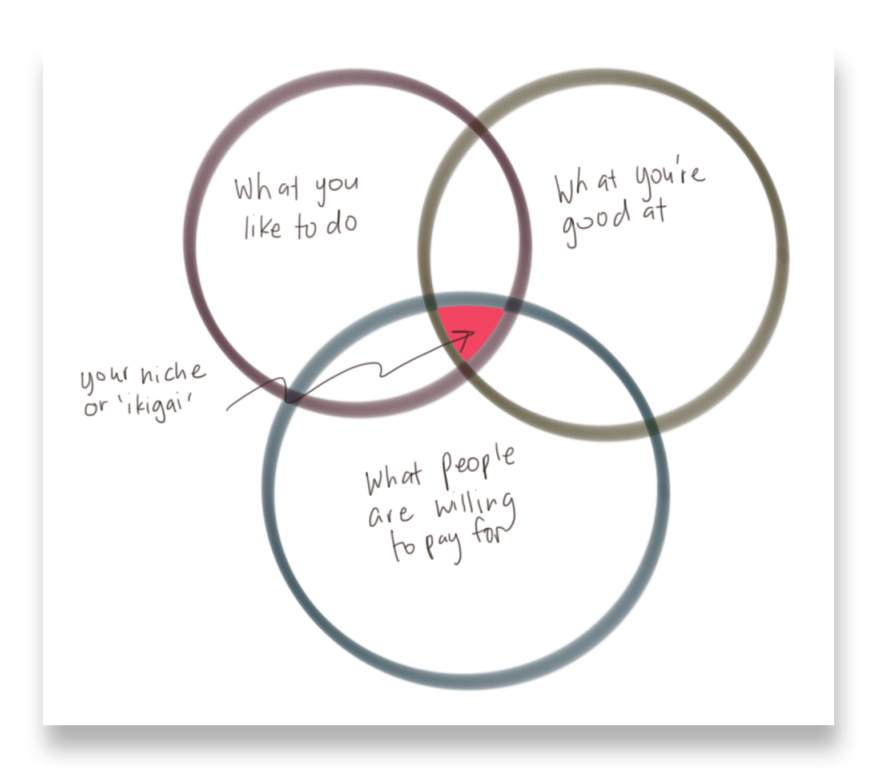
The overlap between the 3 things above, should be your profitable niche. Let’s start with the first step:
Step 1: List Down What You Like to Do
This is the most crucial step. I can’t stress this enough. If you want to be known as a go-to resource for your niche, it takes time, often months to possibly years, before any of your content gets traction.
So if you’re going to create A LOT of content without ever seeing any direct profit in the early stages, you’d better pick something that you enjoy writing and creating videos about.
So for your first step, take out a piece of paper and divide it into 3 columns & label them as you see here:

In this first column, you’ll write down all the things you like to do or want to do.
A great way to approach this is to think in a hypothetical scenario if you don’t have to work for a living (you have all the money in the world), what would you want to do?
Allow yourself to dive deep into your childhood dreams, & go wild. As a practical example, here’s my list:
- I’d like to learn musical instruments & maybe get good enough to perform for an audience for fun
- I like carpenting & woodworking
- I like to talk about money: saving, investing & spending
- I like to cook for pleasure & entertain guest
- I’d like to be able to create digital drawing art on an iPad & share it with my followers online
- I’d like to be a luxury resort owner & entertain my guests
- I’d like to be a TV host or presenter
- I’d like to host a talk show or podcast
- I like stand-up comedy
- I like to be generally organized
- I like my life to be on my own terms and run my own business
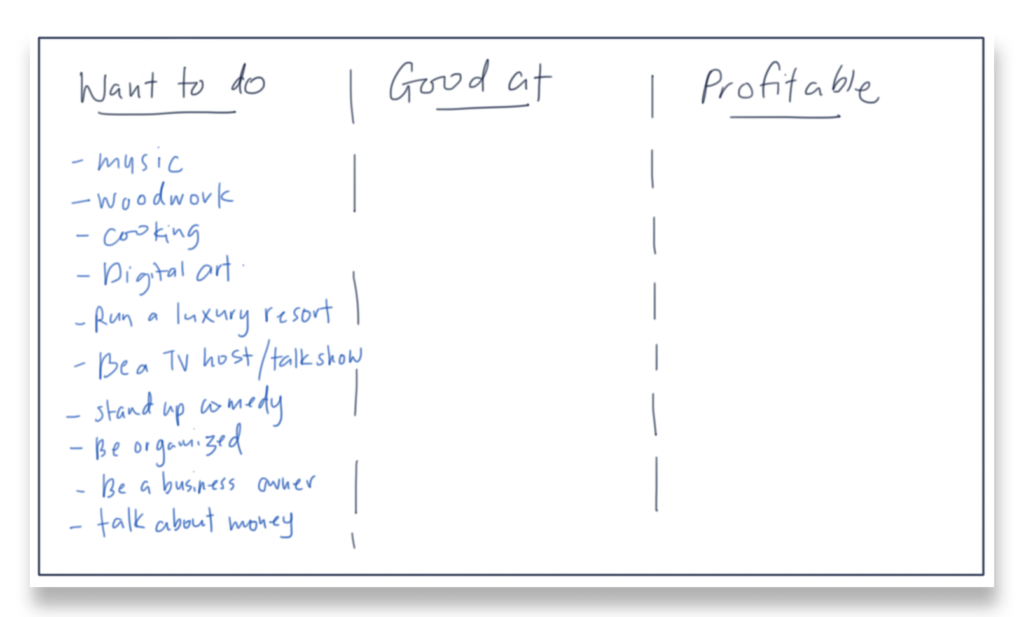
Once the list is done, find out a common theme between all the things that you want to do. From my list, I enjoy being a social host, creating things with my hands & am interested with the topic of money.
This is an excellent personal development exercise. I find it quite therapeutic to pause my boring adult life and reconnect to what I really want to do in life.
Now with the list of stuff that you like to do, the next step is to figure out what you’re actually good at or are capable to learn quickly:
Step 2: Find out What You’re Good at
In the next column of the paper, you’ll list down the things that you think you’re good at. A great way to populate stuff in this column is to ask your family and closest friends, what do they think you’re good at.
For me, here’s what I know I’m good at, and what my friends and family think of me (constructively):
- I am articulate & can explain complicated stuff, so it’s easy to understand
- I am a straight-to-the-point kind of guy, which could be a plus or minus point depending on the situation
- Somewhat good at photography (I was my school club photographer)
- My English is quite good for a non-native speaker
- I’m good at entertaining guests (in my previous Airbnb business)
- I’m a little creative visually (art, design, picking out interior designs & colors)
- I’m good at managing money
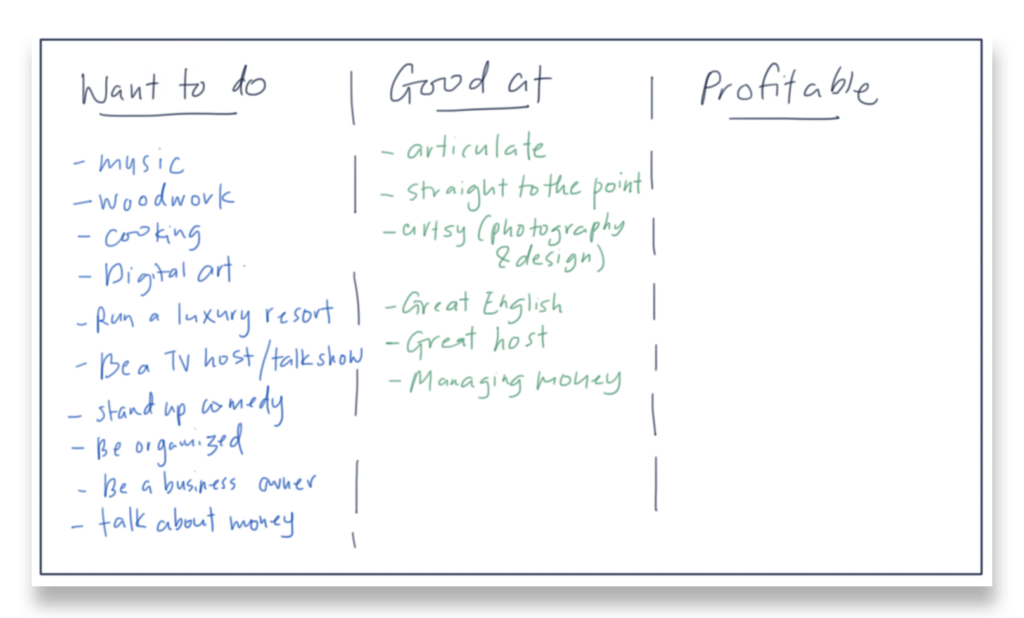
A common theme that I see above is: good communication, organization & money management skills, and a bit artsy
A couple of things that overlap with what I want to do (in column 1) with what I am good at (column 2) that I can consider to be my niche at this point are:
- Run a luxury Airbnb or hospitality business targeting foreign tourists
- A speaker or motivator in a certain topic
- Run a personal finance blog
- Video or talk show persona on a certain topic
Cool! Now we’re going to validate these ideas by seeing which ones can potentially make me money if I have a lot of content around this topic:
Step 3: Validate Which Ideas are Profitable
The last column is where the reality part kicks in and the decider on what you should pick as your niche. In this column, we will eliminate the niches that are not profitable.
There are 2 ways to validate the profitability of your niche selection:
- Check your niche popularity on Google trends
- See the content competition on Google search results
For example, from one of my niche ideas in the previous section, let’s take a look at the keyword ‘Airbnb’ on Google Trends for Malaysia:

As you can see, with the COVID pandemic still rampaging the world (especially Malaysia, where I live), this is a terrible niche to venture into at this point.
I conclude that I will eliminate this niche idea and move on to the next one; starting a personal finance blog.
People don’t usually search for ‘personal finance’, but they would search for something with the keyword ‘money.’
The worldwide trend for this keyword is pretty steady for the past 5 years, indicating that I can expect a steady stream of traffic in the future:
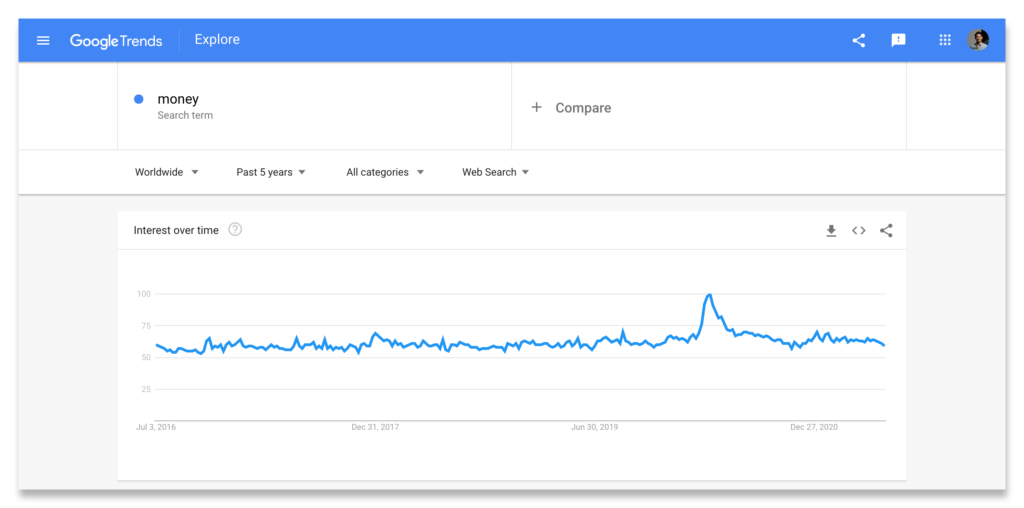
Generally speaking, the interest in money is predictably steady over time.
Plus, I can talk about this topic for hours on end without ever feeling bored.
I can shortlist the ‘personal finance’ niche as one of my specialties.
Step 4: Checking Out Your Competition
As a final check, you need to check out the competition and see if you can add any value to the conversation by producing even better content.
To check out the competition in my example, I Googled ‘personal finance blog Malaysia’ and see the 1st-page results:

Check out the competition one by one, see what they’re writing about, and be true to yourself if you think you can create more valuable and engaging content than what’s already out there.
In my example, I think I can give these top guys a run for their money (you need some confidence here, but don’t go overboard).
OK, next I did the same search on YouTube:

I think the Malaysian personal finance niche on YouTube is still pretty much untapped.
This is a great opportunity for me to also fulfill my wish to be a TV host (having my own YouTube channel).
This is how I validated my niche selection. I then jotted down what is in demand, & what isn’t, in the last column:
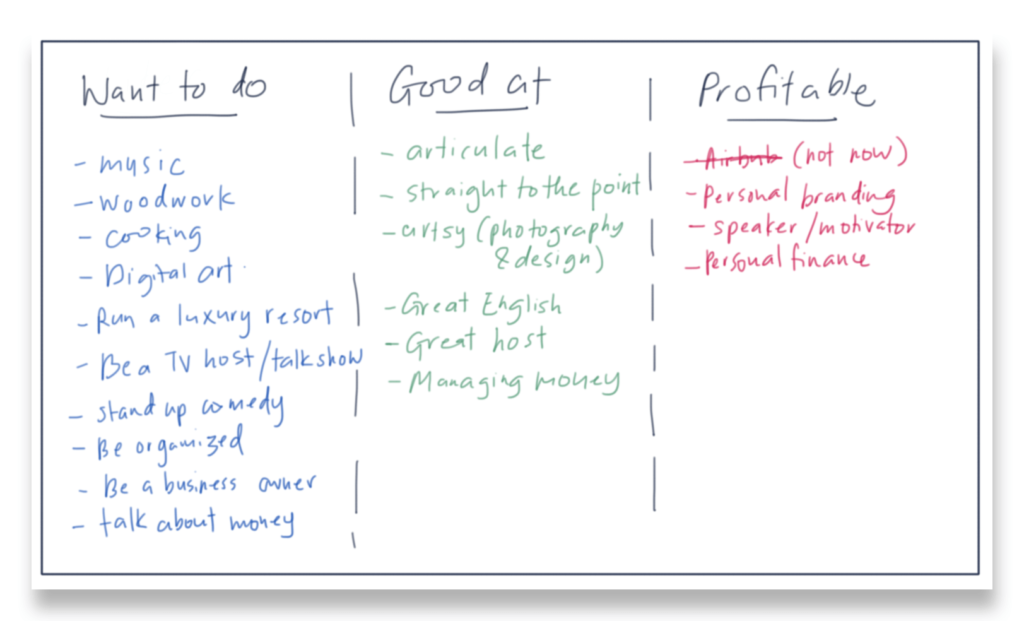
Summary & Start Finding Your Niche!
From my findings above, I decided to run a personal finance blog + YouTube channel where I talk about making, saving & spending money for Millennials.
These were the steps that I took to find and validate my niche. Please understand that everyone’s results will be different.
I also want to point out that picking a niche is pretty important but don’t stress about it too much to the point that you’re not creating any content to test out what works for you.
Remember, nobody really gets their niche right from the get-go.
Often, even for me, we started with a certain niche and further down the line changed strategies once we figured out what works and what doesn’t.
If you’re contemplating whether you or your business need to have your blog, read about my blogging journey here.
Let me know in the comments if you find this post useful, or if you have any comments 🙂






![[SEO] How My Blog Ranked From Page 6 to Page 3 on Google Search Within a Day](https://helmihasan.com/wp-content/uploads/2020/04/Page-6-to-Page-3-Within-24-Hours-768x576-1.jpg)
2 Comments